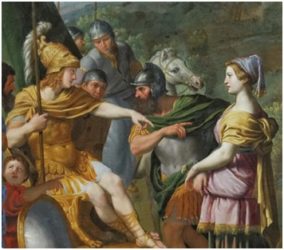
Xairē! That’s ancient Greek for “Howdy.” [KHAI-rae]
Welcome to my blog tour for Becoming, Book 1 of the Dancing with the Lion duology, about the young Alexander before he became “the Great.” It’s an historical coming-of-age tale with a love story embedded.
Best known for conquering most of his known world before the ripe old age of 33, Alexander made even Julius Caesar weep (for not being him). But who was he before his meteoric rise? And how did his best friend and lover, Hephaistion, give him the emotional support needed for him to become Megalexandros (the Great Alexander)?
Dancing with the Lion Website:
Contains everything from cut scenes, to videoblogs of Macedonia (Northern Greece, where Alexander grew up), to audio pronunciations of those weird Greek names!
https://jeannereames.net/Dancing_with_the_Lion/DwtL.html
For our GIVE-AWAY, I’m going to offer something a bit different. Yes, there’s a $10 gift certificate from Riptide Publishers. BUT, for the lucky winner, you get your very own scene request. Want to see a scene in the novel from a different character’s point-of-view? Want to know what happened after a scene ended, or before it began? Or is there something you’d like to see that wasn’t in the novel? Ask for it! I’ll write it just for you.
ALEXANDER AND WOMEN
I’ve heard that Alexander was sympathetic to women. Was he an early femininst?
No. And yes.
Ancient Greece was famously misogynistic. Even Sparta’s supposed freedom for women was all to one purpose: turn them into superior baby-making machines.
 Compared to most Greek men, Alexander did express uncommon respect and sympathy. When Timoklea, a highborn Theban, was brought before him for judgment after having killed her rapists (his soldiers), he took her side. And when he was told his sister Kleopatra had taken a lover (after her husband’s death), his reply was, “Well, she ought to enjoy herself.” To say neither of these responses was typical might be a ginormous understatement.
Compared to most Greek men, Alexander did express uncommon respect and sympathy. When Timoklea, a highborn Theban, was brought before him for judgment after having killed her rapists (his soldiers), he took her side. And when he was told his sister Kleopatra had taken a lover (after her husband’s death), his reply was, “Well, she ought to enjoy herself.” To say neither of these responses was typical might be a ginormous understatement.
Likewise, he was kind to the childless Ada of Karia (a kingdom in south Turkey). She’d been queen there before being ousted by a male relative. Alexander put her back on the throne, and she adopted him as her heir. While that eventually got him her kingdom to add to his growing collection, he did seem to genuinely care about her and kept her on the throne until her death.
Then there was Sisygambis, mother of the Persian Great King Darius—e.g., the mum of Alexander’s chief enemy. After the Battle of Issos, the first major encounter between the two kings, Darius fled the field—leaving behind his whole family. Alexander visited them. They’d been wailing not just for Darius (whom they thought dead), but out of fear of rape, etc. What usually happens to women in war. Instead, Alexander had them protected, refused to take Darius’s wife as his mistress because her husband was still alive, and treated the elderly Sisygambis with utmost respect. He continued to call her “Mother” for the rest of his life, sending her presents from his travels. When Alexander later died in Babylon, she turned her chair to the wall and starved herself to death, in grief.
Now, let’s be honest here. These are lovely, romantic tales. Had Timoklea been a slave, not a highborn woman, not only would Alexander not have cared, he’d never have heard about her rape in the first place. And Sisygambis probably feared what would happen after Alexander was gone, so better to die on her own terms. Also, Alexander supposedly gave away his mistress Kampaspe to his favorite painter Apelles because Apelles was (he said) in love with her. So far as we know, Alexander didn’t ask Kampaspe’s opinion before doing this.
So no, Alexander wasn’t a feminist. He belonged to his time. Yet for the ancient world, his sensitivity to women was unusual. We can, I believe, thank his mother (and sisters) for making him as much of a feminist as the ancient world might allow.
Follow Keopatra’s story in Dancing with the Lion. It’s not ALL about the boys! Alexander’s sister has her own coming-of-age arc across both books, too.
 Title: Dancing with the Lion: Becoming by Jeanne Reames
Title: Dancing with the Lion: Becoming by Jeanne Reames
Dancing with the Lion Series Book One
Publisher: Riptide Publishing
Genre: Historical, Gay, Action/Adventure, Romance
Length: 282 pages/Word Count: 92,000
Summary:
Two boys, one heroic bond, and the molding of Greece’s greatest son.
Before he became known as Alexander the Great, he was Alexandros, the teenage son of the king of Makedon. Rather than living a life of luxury, as prince he has to be better and learn faster than his peers, tackling problems without any help. One such problem involves his increasingly complicated feelings for his new companion, Hephaistion.
When Alexandros and Hephaistion go to study under the philosopher Aristoteles, their evolving relationship becomes even harder to navigate. Strength, competition, and status define one’s fate in their world—a world that seems to have little room for the tenderness growing between them.
Alexandros is expected to command, not to crave the warmth of friendship with an equal. In a kingdom where his shrewd mother and sister are deemed inferior for their sex, and his love for Hephaistion could be seen as submission to an older boy, Alexandros longs to be a human being when everyone but Hephaistion just wants him to be a king.
Add to Goodreads.
Add series to Goodreads.
Purchase Link: Riptide Publishing
About the series Dancing with the Lion
Alexandros is expected to command, not to crave the warmth of friendship with an equal. In a kingdom where his shrewd mother and sister are deemed inferior for their sex, and his love for Hephaistion could be seen as submission to an older boy, Alexandros longs to be a human being when everyone but Hephaistion just wants him to be a king.

Author Bio
Jeanne Reames has been scribbling fiction since 6th grade, when her “write a sentence with this vocabulary word” turned into paragraphs, then into stories…and her teacher let her get away with it—even encouraged her! But she wears a few other hats, too, including history professor, graduate program chair, and director of the Ancient Mediterranean Studies Program at her university. She’s written academic articles about Alexander and ancient Macedonia, and does her best to interest undergrads in Greek history by teaching them (et al.) to swear in ancient Greek
Author Links: Website * Facebook * Twitter * Goodreads * Instagram
Giveaway
One lucky person will win a $10 voucher for Riptide. But this giveaway also includes something much more personal:
Your very own SCENE.
I’ve committed to write, for the give-away winner, a scene of her/his/their choice.
Would you like to see X scene described from a different character’s POV (point-of-view)?
Or would you like to know what happened just before X scene, or right after?
Or maybe there’s something I didn’t write about at all, but you’d like me to write it for you?
There are some parameters, especially for the third category (write a scene not included). The request is subject to my agreement that the characters would engage in the requested behavior. So keep that in mind. (I wouldn’t write a scene wherein Alexander beat his dog, for instance.)
But I look forward to the winner’s scene challenge!
I have some “cuts scenes” as well as “missing scenes” (in the year between the novels) that will be available on my website (https://jeannereames.net/Dancing_with_the_Lion/cut_scenes.html) after July 1st
When done, this one will join them.
Each tour stop is a chance to enter by leaving a comment below. Entries close at midnight, Eastern time, on June 6, 2019. Contest is NOT restricted to U.S. entries. Thanks for following the tour, and don’t forget to leave your contact info!

This question and answer is excellent! Alexander was ahead of his time in many ways, respect of women being one. Thus Dr. Reames’ treatment of Kleopatra and Myrtle in the book is very fitting. Will there be different and more questions in upcoming blogs?
Some have the question in the title. And one of them was inspired by you. (Well, not one of the title questions, but one of the blog posts.)
Glad you enjoyed it. And Kleopatra was one of my favorite characters to write. You get more of her in Book 2, I think.
Inter=sting info about Alexander and how he treated women. I didn’t know this.
jlshannon74 at gmail.com
Thank you. There’s a reason Alexander has more female historians studying him than most ancient Greek or Roman men. 😉
I’d love to read this!
Vitajex at aol dot com
If you do, I hope you enjoy!
Looks interesting. Thank you for the post!
humhumbum AT yahoo DOT com
Thank you for the interest! Hope you enjoy the novel if you read it!